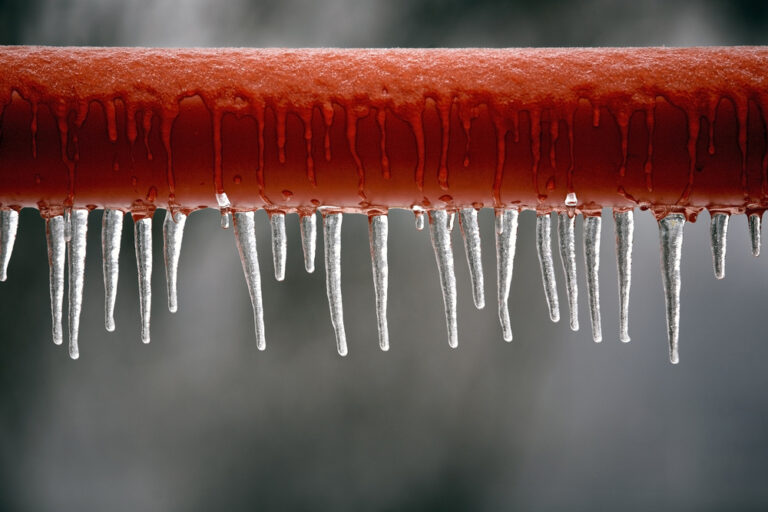Winter is no friend to homeowners and their houses.
Even if you take off every winter to warmer climates, the condition of your pipes needs to be taken into consideration.
Without proper care and winterization, you could be facing a significant problem when you return.
Or perhaps you live in your home all-year-round. Even your continued presence may not be enough to prevent an expensive disaster from occurring with your pipes.
No matter your wintertime situation, you can take preventative steps to ensure that your plumbing system does not succumb to freezing and bursting during the winter:
Can Homeowners Winterize Their Own Pipes?
Absolutely! Winterizing your pipes doesn’t take fancy equipment or vast plumbing know-how – just some time and a plan.
That said, there are reasons why you should consider hiring a professional plumber to do the job:
- Timing. Even well-intentioned homeowners can miss the mark on having their pipes winterized in time for the freezing temperatures. Scheduling with a plumber means that the work will be done before any damage is caused by cold weather.
- Efficiency. Winterizing your pipes involves a series of steps and the entire process can be thrown off-kilter if you miss one. Expert plumbers can perform winterization completely without risk of issues down the road.
- Vacation Homes. If you don’t use your home during the winter, there are special techniques a plumber can use to ensure no pipes burst while you are away.
- Proactive Repair. When a professional plumber prepares your pipes for winter, they may notice damages and repairs that need to be addressed – saving you from extensive and expensive repairs in the future.
Our expert technicians are more than happy to help prepare your home for the frigid winter months!
Otherwise, here are the steps that need to be carefully followed in order to get the job done yourself:
How to Winterize Your Pipes for Seasonal Homes
The key to winterizing the pipes of your home while you take off for the winter is removing as much water as possible to prevent freezing and bursting.
- Shut off the main water valve before turning off the water pump and heater.
- Open all drain valves and taps. Keep a list of all the valves and taps in your home to ensure that they have all been opened. Otherwise, a closed tap could create a vacuum that will hold water inside the pipes – this can lead to freezing and bursting.
- Using an air compressor, blow excess water out of the pipes.
- Open the drain valve in your hot water tank until the tank is empty. You may need to use a garden hose if there is no floor drain.
- Drain the water from your holding tank.
- Flush toilets to remove water from the tanks and toilet bowls. If you can’t remove all of the water, add antifreeze to prevent freezing and cracking of the toilet.
- Check all drain traps. Add some antifreeze to prevent water from freezing and cracking the traps.
How to Prevent Pipes from Freezing
If you live in your home during the wintertime, you obviously don’t want to remove all the water from your pipes. However, you also want to keep your pipes from freezing and bursting.
When it comes to protecting your pipes during the wintertime, the key is prevention.
Insulating Your Pipes
You want to make sure you properly insulate your pipes. This is a simple procedure, which involves wrapping pipe insulation around the plumbing lines and securing it with electrical tape.
The good news is that you don’t necessarily have to insulate every pipe in your home – the most important pipes to protect are those that run through unheated spaces such as exterior walls, unheated garages, crawl spaces and attics.
By insulating your hot water pipes, you can reduce heat loss and lower the cost of heating your home throughout the wintertime.
Alternatively, insulating your cold water pipes will prevent sweating and reduce the amount of humidity in your home during the summer months.
Keeping Out Cold Air
Anywhere cold air can make contact with a pipe, the higher potential of freezing. Even the tiniest hole can let in a significant amount of cold air.
To prevent drafts from freezing your pipes, close off crawl-spaces and vents and stuff insulation over the openings.
You should also inspect the exterior of your home for visible cracks that need to be sealed.
Not only will keeping cold air out help prevent your plumbing from freezing, but it will keep your warm air in as well.
Leave the Heat On
Try to leave your heat on at all times.
This step may make your wallet cringe, but with a programmable thermostat, you can easily set the temperature to 55⁰F and have the system turn on only to maintain this temperature.
Otherwise, you may choose to individually heat rooms where your pipes run along exterior walls.
At the very least, you can leave a faucet dripping in order to prevent still water in your pipes from freezing and causing the pipe to burst.
Get Ready for Winter
Some homeowners are all about the DIY and are more than happy to winterize their own pipes.
If this doesn’t sound like you, you’re in luck – Peak Sewers is available to get your plumbing ready for winter!
Whether you are saying goodbye to your home for the winter, or are hunkering down for the cold months, our expert technicians can prepare and protect your home from the damaging cold.
Don’t get stuck in the middle of winter with a burst pipe – Get in touch with us today!

